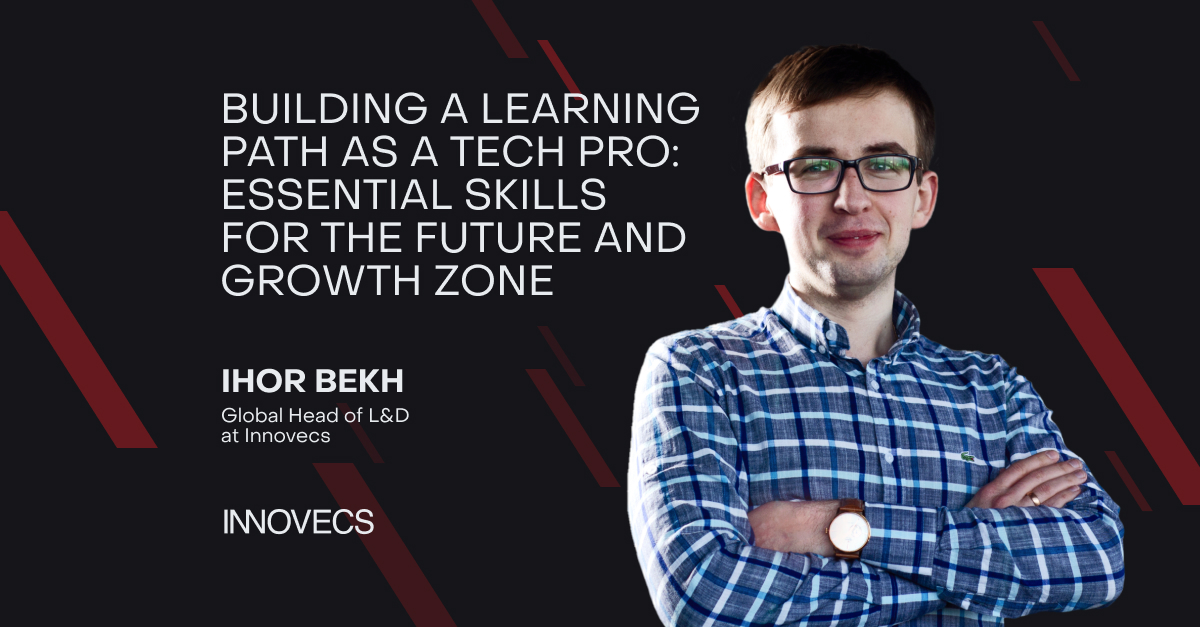My name is Ihor Bekh. I work as the Global Head of L&D at Innovecs, a senior lecturer at the Department of Management and Innovation at the International University of Finance, and a mentor at the “El`Lab” E-learning Bootcamp. I am a certified instructional designer and trainer with 12 years of experience in adult education, e-learning, and marketing.
I am currently responsible for the management of InnoCamp, the innovative educational campus of Innovecs.
In this article, I will discuss how much your career depends on your chosen educational path. I will introduce different learning approaches and share the educational work experience with Junior Software Engineers and Middle and Senior level engineers.
Staying in demand in 5-10 years
Over the past two years, the introduction of new technologies has accelerated. Artificial intelligence has found its application in the fields of digital information and communication, financial services, healthcare, and transport. Professions have appeared that require new competencies in Data Science, Machine Learning, Emotional Intelligence, etc. The world is constantly digitalizing.
As per The Future of Jobs 2020 report, the ten most in-demand tech fields will include the following:
- Data Analysts and Scientists
- AI and Machine Learning Specialists
- Big Data Specialists
- Digital Marketing and Strategy Specialists
- Process Automation Specialists
- Business Development Professionals
- Digital Transformation Specialists
- Information Security Analysts
- Software and Applications Developers
- Internet of Things Specialists
In the next five years, 40% of specialists will be forced to completely change their basic skills and competencies, and 50% of all employees will have to be entirely retrained by 2025. Tech specialists are becoming increasingly in demand, but at the same time, their development paradigm is also changing.
Knowing JavaScript or Python used to be quite enough, whereas now it is desirable to master several programming languages, frameworks, and libraries to solve business problems. A modern tech team consists of specialists from various fields: Front-end, Back-end, DevOps, etc. Even 20 years ago, we acquired specializations, deepening our expertise mostly vertically. Now it is worth gaining knowledge in related areas.
For example, a specialist working as a Team Lead is responsible for the entire team’s work and must be well-versed in all areas of specialists involved in the project. But still, a lead’s expertise is not so deep, therefore, as a rule, such specialists are called generalists — the ones with a broad outlook but superficial knowledge in areas.
The number of required competencies has increased, and education is not keeping up with the business growth. We are approaching a stage when companies that have invested heavily in human capital, in the skills and competencies of their employees, will be the most competitive.
Why corporate competencies matter
Most international companies develop corporate competencies, which are a guide for future employees about the skills that can be learned in the company. Not only technical expertise is taken into account, but also soft skills. Not only a mentor/trainer but also a Recruiter or Project Manager can assess the skills and competencies of a future specialist/employee.
At this phase of assessing the applicant’s skills and competencies, the candidate may be invited to participate in a business game or simulation, where informal leadership, emotional intelligence, the ability to communicate and cooperate in a team, as well as a number of behavioral factors can be revealed.
Of course, there are many online tests for determining soft skills, but I would not recommend taking them instead of practical exercises in offline mode because this way you can only evaluate knowledge without behavioral factors.
Overall, soft skills are best developed while working on projects. If you join an environment that will promote your development, you will definitely be able to do it.
Each company has its own corporate competencies, which may partially overlap. If you are a business representative, make sure to form corporate competencies, and for tech professionals who are just starting their career or those who are looking for career development, I recommend visiting company websites and preparing yourself for a specific role according to a set of corporate competencies.
The top-10 soft skills by 2025
When developing the formula for corporate competencies, you can take into account the 10 most popular soft skills that will be in demand by 2025, according to the World Economic Forum research.
- Analytical thinking and innovative solutions
- Active learning
- Solving complex problems
- Critical thinking and analysis
- Creativity, originality, and initiative
- Leadership and social influence
- Use of technology, monitoring, and control
- Development of technologies
- Stress resistance and flexibility
- Intellectual activity, problem-solving, and idea formulation.
Therefore, I would highlight four main groups of skills needed in the future:
- Skills that help the business
- Skills that help self-organization (time, energy management)
- Skills that help you collaborate
- Technology skills in a particular area
The experience of working with tech leaders indicates the undeniable fact that soft skills never lose their relevance. If hard skills require constant improvement and change quickly, soft skills are more durable.
It is vital for an engineer to develop both, and for an Engineering Manager, it is recommended to focus especially on soft skills. I will touch on a few of the most crucial ones.
Effective communication
A good communicator knows how to find an approach and clearly express own ideas. And it is not about conveying information but the ability to choose the best message format according to the audience type.
It is also important to be flexible and anticipate possible scenarios of the events and the reaction to them.
As for the project’s scale, an effective communicator knows how to transmit key messages succinctly and as accurately as possible. The more you communicate, the less room there is for misunderstandings.
Teamwork
Big goals are achieved only through the coordinated work of the entire team. Paradoxically, not everyone knows how to be a good team player. But this is a great opportunity to learn to see a common result, not just personal targets. You will achieve much more in a team than alone.
An effective team player always creates a positive, friendly vibe around oneself, respects the skills and talents of his colleagues, and comes to the rescue in a timely manner.
Cooperation is always superior to competition. The latter is like a short-term game, while the former implies mutual growth and long-lasting relationships. In cooperation, relationships deepen, creativity grows, and innovative ideas come to life.
Negotiation Skills
As an tech leader, you need to be clear about your priorities and set boundaries between what you want and what you don’t. When preparing for negotiations, you should operate the facts and objective arguments and always refer to the source.
A win-win strategy is achieved by listening and respecting the interlocutor. This is the only way to build long-standing business relationships. In negotiations, one should strive for consensus, not confrontation.
Sometimes you can lose a small battle for the sake of a big one — that’s the whole point of effective negotiation.
The ability to resolve conflicts
Quite often conflicts stimulate development if they are resolved constructively. But not everyone knows how to draw the right conclusion and learn something from a conflict. This is rather a feature of experienced and courageous leaders. In order to avoid conflict escalation, it should be resolved at an early stage, not delayed or postponed.
If you are clear about expectations, deadlines, and policies, communicate transparently, and are fair, conflicts will not arise. And if they do arise, then only for the growth of both parties.
Adaptability
This is an essential trait for tech leaders, empowering them to move forward and learn new things. It’s largely about being able to step out of your comfort zone to achieve bigger goals. By being flexible, you can adapt to any changes in processes and environment. Regardless of the situation, you know how to find a way out, quickly adjust and find a plan C.
Adaptability is an indispensable quality in crisis situations that helps you stay afloat. During the war, Ukrainian techies have the opportunity to train their adaptability.
Emotional Intelligence
Tech leaders with a high level of EQ skillfully manage their own emotions as well as those of others. Self-reflection is one of the key attributes of people with robust emotional intelligence. They do not make decisions emotionally and show stress resistance in crisis situations.
Emotional intelligence is trained throughout life, and the best environment for this is an tech team, where you need to communicate with others, tackle challenges, and demonstrate flexibility.
Positive thinking
As strange as it may sound, people with positive thinking are usually more effective. They avoid negative attitudes, stereotypes, stereotypes, gossip, and complaints. Positive people find opportunities where others see problems.
Have you noticed how often a good joke defuses a problem with missed deadlines or conflict situations? It’s also about a positive outlook on life.
Business ethics
Understanding and respect for the company’s corporate culture is an indication of professionalism and maturity. It comes with experience in different companies. Engineers learn to deliver projects on time, meet deadlines, and respect the work of colleagues.
An essential hallmark of a high work ethic is taking responsibility for project successes and mistakes. The golden rule is to never blame others, never deny mistakes, but accept and learn.
Time management
Time management starts with prioritizing life goals. Effective tech leaders know how to use the Eisenhower matrix and divide their tasks into important and urgent, important but not urgent, unimportant but urgent, and unimportant and non-urgent.
Currently, most professionals use tools to track their time because it belongs to one of the most expensive resources.
Constructing the educational trajectory: I-shaped, T-shaped, P-shaped, and M-shaped approaches
The development of the corporate skillset is becoming the primary focus of educational programs and training courses in companies. In fact, the educational trajectory is built in such a way as to promote the development of the necessary competencies. There are several approaches for this, depending on the placement of the horizontal:
- I-shaped (general knowledge and skills);
- T-shaped (general knowledge and skills + expertise in one of the areas);
- P-shaped (general knowledge and skills + expertise in two areas);
- M-shaped (general knowledge and skills + expertise in several areas);
Speaking of a QA engineer’s skillset, one can develop as an I-shaped specialist or generalist, i.e., have knowledge in each specific area — how to work with Selenium, xPath, Maven, jUnit, SQL Databases, Cucumber, how to write tests in Java for automated testing, etc.
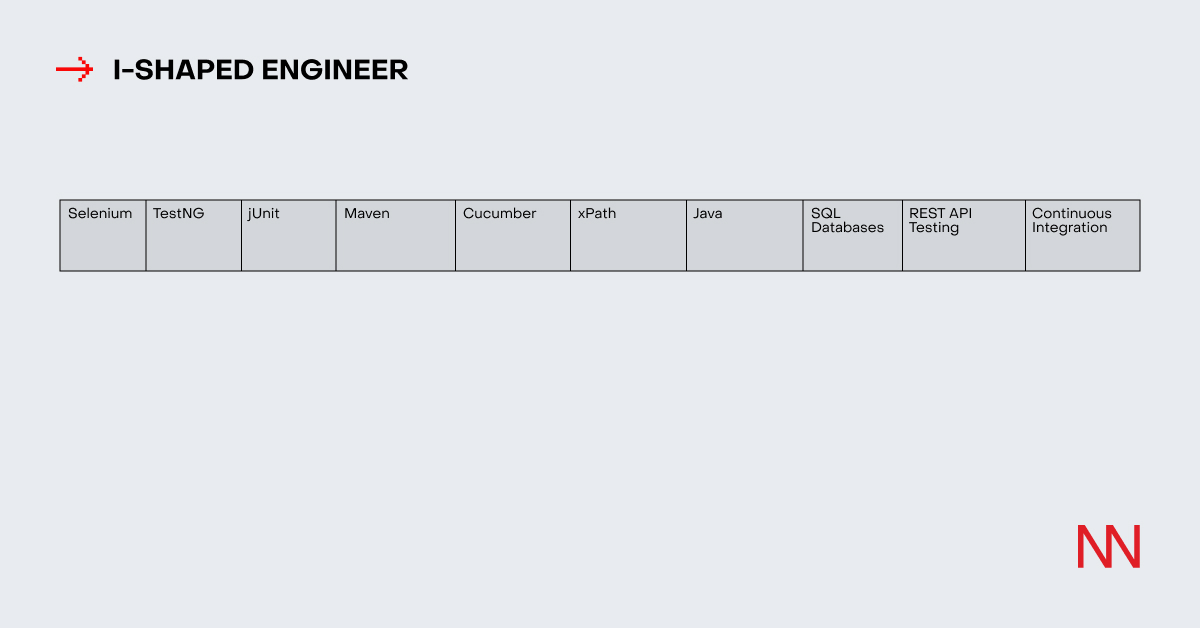
But if you plan to deepen your expertise in a specific area, for example, in Java, you will gradually move from an I-shaped engineer to a T-shaped one, simultaneously advancing to the level of a Middle\Senior specialist.
Universities help to develop a general outlook and obtain a wide range of knowledge, and basic skills can be acquired during educational programs or training courses for beginners.
T-shaped approach
The T-shaped approach appeared back in 1991 and gained popularity thanks to Tim Brown, CEO of IDEO, who is the founder of the Design Thinking approach. Tim Brown believed, a team that includes T-shaped specialists is much more effective from a business perspective. After all, in addition to a broad mindset, one has profound expertise in a certain field. And it is not only about human skills but also about technical ones.
So, among the options for the career development of an I-shaped engineer is the transformation from Manual QA to Automation QA, given Java is being studied in-depth. In addition, the engineer will be able to use expertise in Java not only to write tests but also to move into the Back-end direction, and use Java as a separate programming language and not only as a QA Automation engineer.
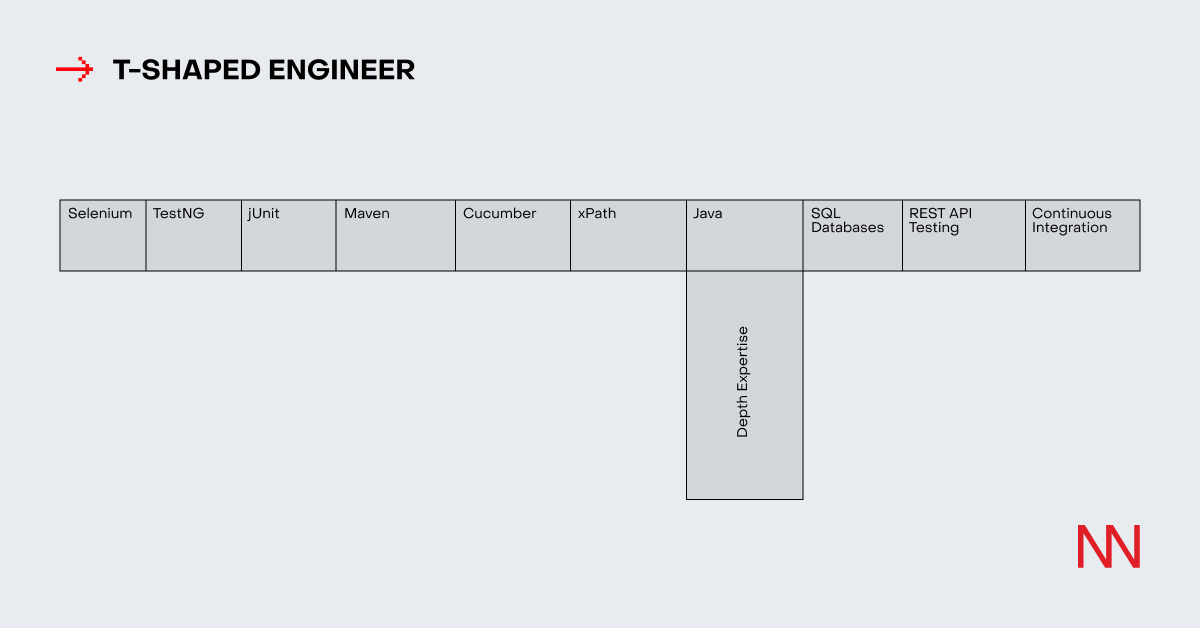
P-shaped approach
P-shaped approach involves the parallel development of basic soft skills and technical skillset in a separate professional field. Therefore, it is possible to develop one of the areas of human skills and focus on the development of the participant’s technical specialization. If it is Automation QA, it is worth deepening expertise in Java, because for this area it is essential to be able to write autotests. Depending on your abilities, talents, and professional background, you can focus on developing vertical expertise in several directions.
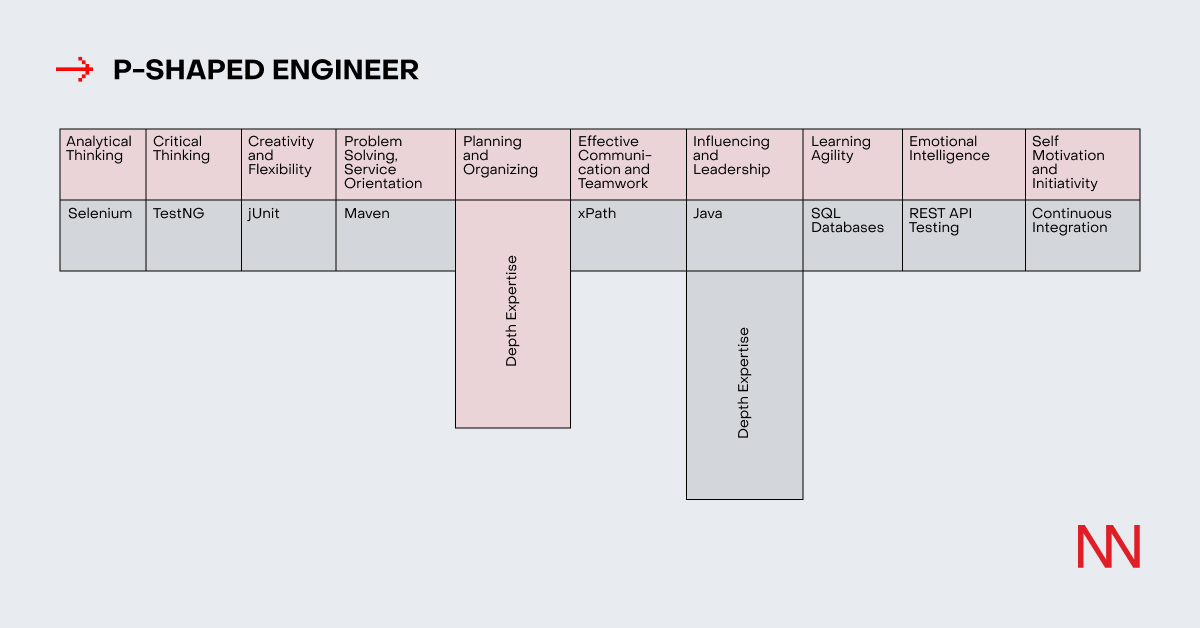
M-shaped or combo-shaped
For a modern specialist, it is not enough to develop just human and tech skills, but it is also pivotal to acquire expertise in the domain. For example, doing programming and delving into area specifics (FinTech, HealthCare, Supply Chain, etc.).
A technical specialist is responsible not only for code quality and choosing the best solution for product development but also for effective interaction with the team and communication with all project stakeholders. Not everyone pays attention to it, however, modern realities require domain expertise in order to interact seamlessly with customers and the product owner.
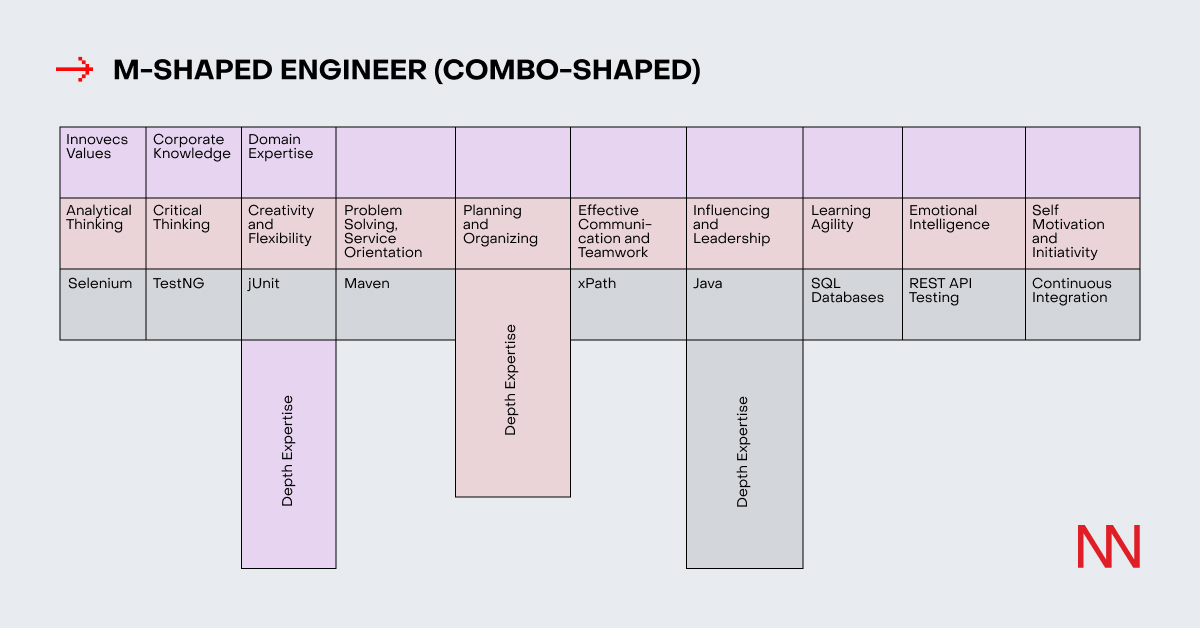
Thus, our current trajectory of a tech specialist development looks like an M-shaped or combo-shaped approach. The authors of this approach indicate that it is possible to invent new expertise, not stop at only three areas.
To evaluate the success of the M-shaped skillset, you can conduct a Performance review and quarterly evaluations according to various models. One of the popular models is the “360-degree” evaluation, which allows you to evaluate a specialist’s human and technical skills and receive feedback from the Team Lead, team members, and the Product Owner. Another tool is the scorecard, which allows you to evaluate your skills in a certain area and helps project your future educational plan.
When shaping your educational trajectory, I recommend choosing a partner company that allows you to develop skills and competencies throughout your career from an I-shaped specialist to T-shaped, P-shaped, or even M-shaped. You can start with courses that will help you immerse yourself in a specific area, and in the future expand your horizons with the help of soft skills, improve Business English and look at the directions that are of interest to you.
This is especially relevant for switching. If the acquired career has ceased to excite you, and you want to try something new and long for changes, you can move from one area to another with the help of T-shaped and P-shaped trajectories. For example, knowing Java, you can move from Automation QA to Back-end, or you can shift to Mobile from Automation QA with knowledge of Java.
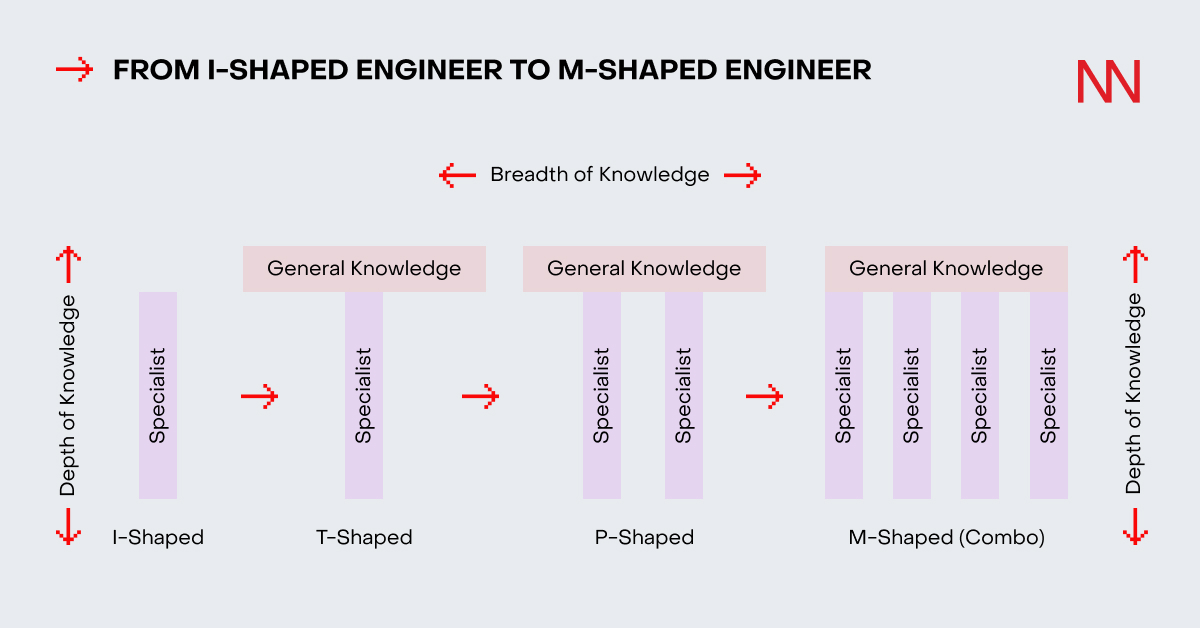
Dealing with blockers in the work process
Thanks to the T-shaped, P-shaped, and M-shaped approaches, we can change team competencies and expertise. This is how you can insure yourself against the bus factor when only one specialist in the team has the expertise. For instance, if one of the specialists does not join the project for good reasons or has changed to another one, a specialist with the same competence can be selected from the team for replacement. The educational trajectory allows specialists to possess a wide range of knowledge and expertise in several areas. In this case, they are always competitive because they usually have expertise in two technical areas or know several programming languages or frameworks. Teams develop each other and share expertise. The method of pair programming or Extreme Programming, as well as working in cross-functional teams, helps a lot in this matter.
A modern tech specialist must constantly upgrade own qualifications and take care of Continuous Learning. If you are considering changing your career, go through the companies and choose the one where you will feel comfortable developing your learning trajectory. Pay attention to corporate competencies and domain expertise required for a specific role.
Having found something that interests you and allows you to constantly evolve, you will progress in your career and enjoy your work. At the same time, bear in mind that human skills should be developed throughout life. If you decide to join the InnoCamp training programs, please contact innocamp@innovecs.com.
